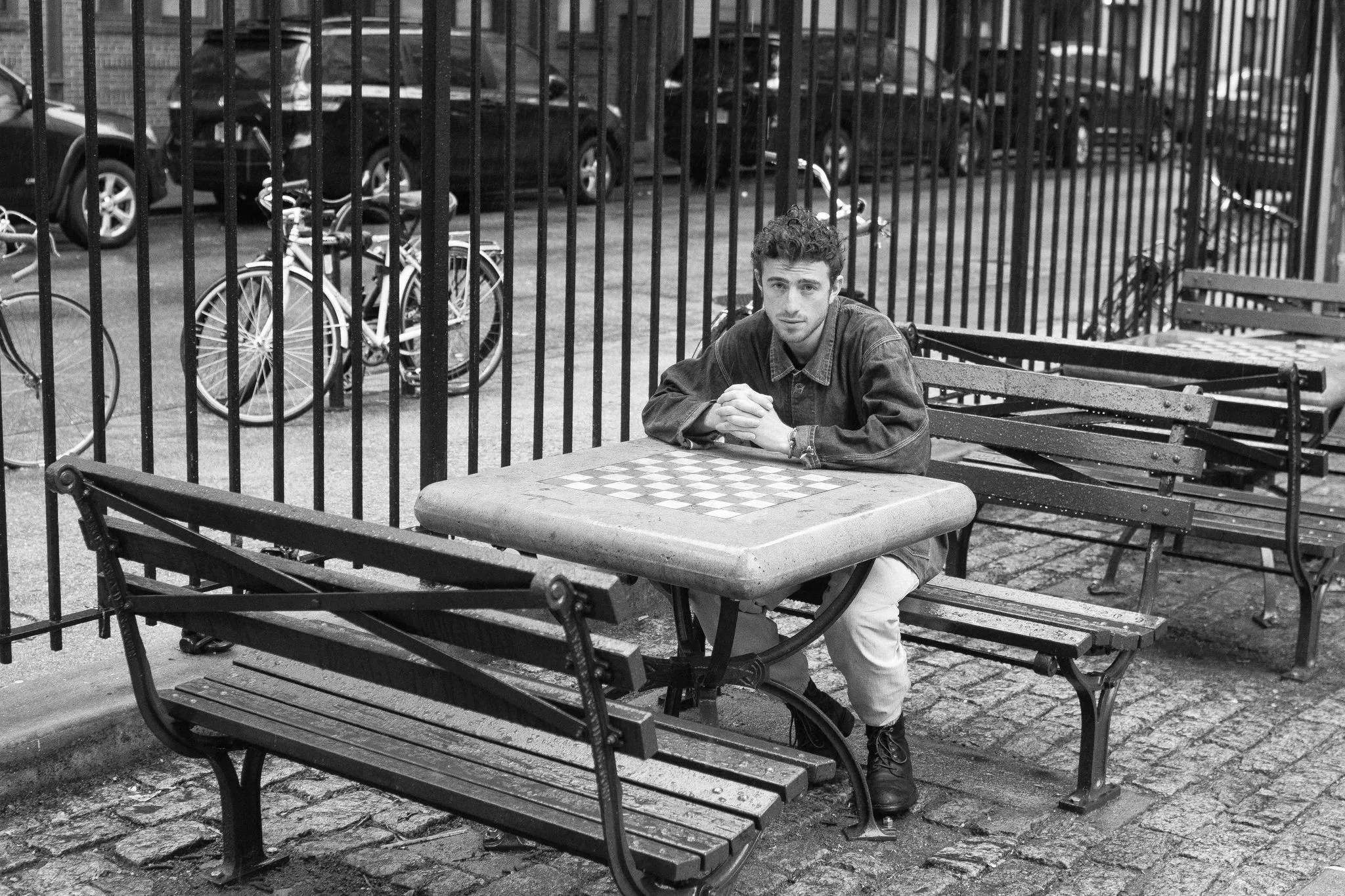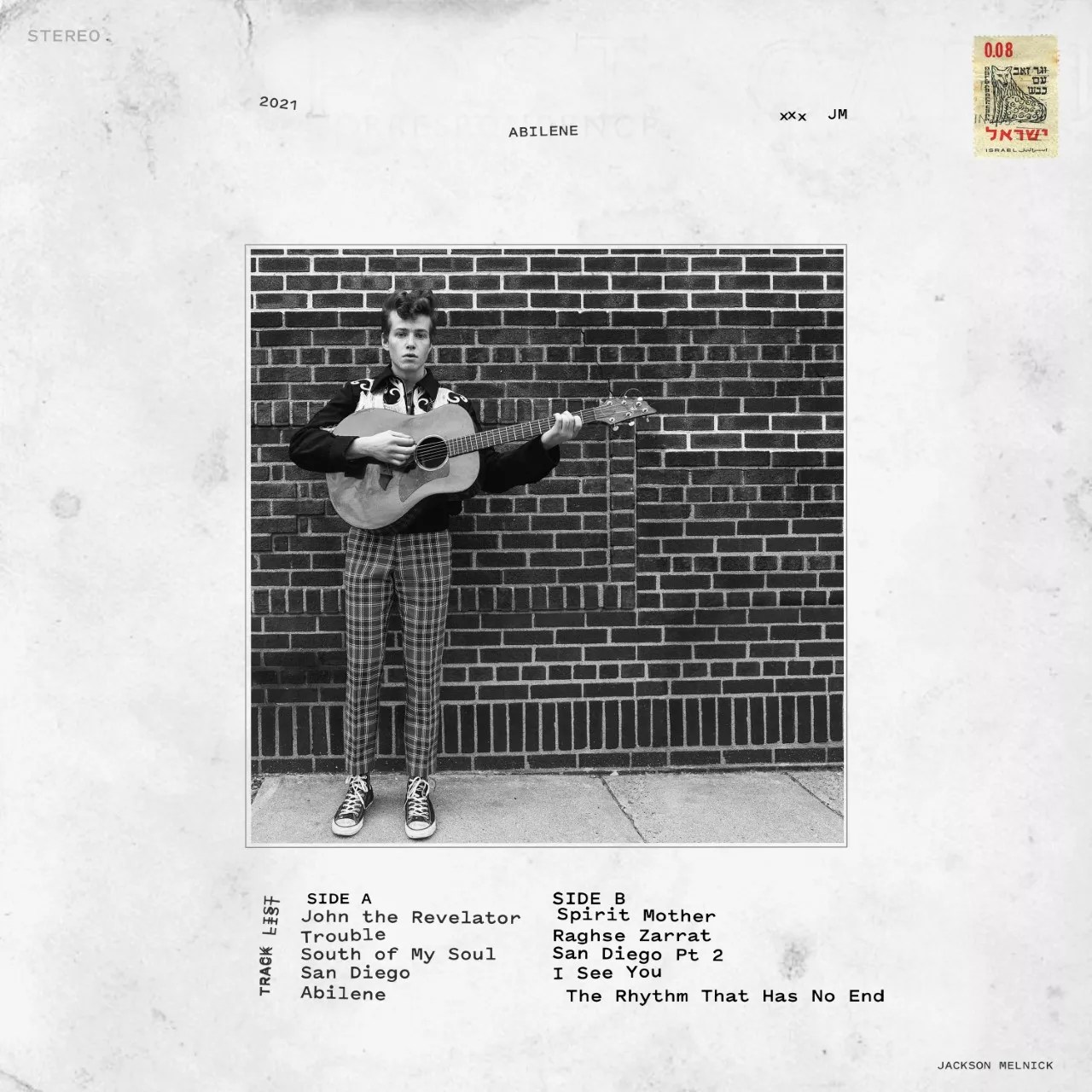
Bellamy Brewster

Audio By Carbonatix
Jackson Melnick‘s first video for a song called “San Diego” drops today, and it’s debuting right here, right now. The song is off his upcoming album Abilene, which comes out on September 24. Melnick’s sound is something he calls “progressive gospel bluegrass,” but he quickly admits that he totally just made up that genre. But maybe he has a right to: He’s 26 and has been writing songs for a decade and performing longer than that on the streets of Crested Butte, where he was raised. And while he has an album title that talks about Texas and a song set in California, his sound is very much Colorado.
We caught up with the up-and-coming singer-songwriter to talk about his new album, Steve Earle, social work, and making music in the mountains.
Westword: We’re debuting the first lyric video, “San Diego,” from your new album, Abilene. Can you talk a little about the song itself? How did it come about in terms of the idea?
Jackson Melnick: In a very literal sense. I had driven down to San Diego from Los Angeles to see a high school buddy of mine, who was visiting there from Montana with his new wife. I was on the highway in the rain, and I had received a text from someone I loved and missed very much, someone things had ended with in a very dramatic and unsettled way. The text was full of peace, recommitment to love. We didn’t end up back together because of it, but that wasn’t the point. There was a redemption of my love, a recognition of love’s eternal bondedness, and then a peace and presence. I got home and wrote that song.
Place sure seems to play a large part in this album. How do you find the echoes of place in lyric and melody?
I think the right instrument or the right little biosphere can produce a song, can actually manifest it, and the musician becomes the channel. That has happened to me a few times and is a really exhilarating experience. None of the songs on this record have that origin. I much more consciously tried to write “about” places or use places as a sort of prompting anchor. The song “Abilene” has some origin in the George Hamilton IV song by the same name. That song, I guess, is about Abilene, Kansas. This song is about Abilene, Texas – which I guess makes it a different song.
So you grew up in Crested Butte. How did your upbringing contribute to your music?
I was probably among the last of the kids who grew up in Crested Butte before all the streets in town were paved. My foundations are in that kind of small-town mountain living – which includes a profound amount of privilege – but my understanding of what time was and what people are was all very entwined with the seasons and with community, village-style living.
And that included a love of music?
I loved bluegrass music from a very young age. I remember seeing Steve Earle in the alley of the Boulder Theater. I have a funny history with Steve. He was smoking a cigarette, and I requested “Mystery Train Pt 2” from my stroller. So in a sense, my affinity and love of bluegrass-Americana has been very formative for me, in terms of values both musically and spiritually.
If you’re going to drop a line like “I have a funny history with Steve Earle…”
Well, I don’t want to violate Steve’s privacy, and I also don’t want to be unnecessarily cryptic. I had a psychic moment with him. I was in the car on a trip to see family friends in Ireland, and we were headed to Galway, my dad, brother and I. Steve Earle, of course, has the famous song “The Galway Girl”: “Tell me friend, what’s a fellow to do, when her hair was black and her eyes were blue.” A great song. As we were headed south, I blurted out “Steve Earle is in Galway.” My dad and brother started laughing out loud, at the cliché of it, and challenged me to consult Google. The phone suspiciously announced some Steve Earle dates in the north of Ireland the following week. That was satisfying enough. When my dad saw him walking down the Galway Promenade later that afternoon, escorted by two butterfly-inducing black-haired, blue-eyed Gaeltacht women, he shouted, “Steve.” Steve walked on over, and we all talked for a minute or two about the tour he was on, his new project at the time, and the Red Lady Mine that had threatened Crested Butte for a long time – he’d done a benefit concert to help the protests. The girls stayed about a stone’s throw away, maybe took a cigarette on the building across. My dad wanted a picture of all of us, but it seemed like Steve was itching to get back to his stroll, and I dismissed my dad’s request. “We are not mere fans,” I am sure is how I sounded. Well, we were. And now I wish I had that picture, man!
How did you start in music as a kid? What did you pick up first?
I wanted to play the banjo – eleven-year-old me thought that might impress a certain girl. Truth was, I had very little that would impress any middle school girl. My parents were not keen on hearing beginner banjo. I got stuck with the guitar, and the guitar got stuck with me. I was recently given a Martin HD-28, a new one, and it’s a powerful instrument.
First gig?
I’m not sure this counts as a gig, but the strangest place I ever played was an open mic at a Mongolian biker bar in Chengdu, China. You can’t make this stuff up. I represented Townes Van Zandt’s “My Proud Mountains,” a song about our own Rockies.

Jackson Melnick
Circling back to this new album – what of Colorado do you feel is in the mix?
There is that line in “Me and My Uncle”: “I’m as honest as a Denver man can be.” That line never really sat with me right, as I feel like Coloradans are among the most honest and forthright, compassionate folks out there. Perhaps honest to a fault. I definitely strive for that honesty, which I suppose indicts me as a liar. Growing up here gave me a head start.
We’re not solitary people, Coloradans. If somebody is solitary, they become “the solitary fellow” until they aren’t anymore. They’re respected for what they are, and that can change. A Black friend of mine visited Crested Butte from New York City; he grew up in Georgia. He said he’s never felt so able to be himself than he did in Colorado. I took that as the highest praise, something we ought to preemptively work to preserve as a state, if you ask me. I suppose that also means people are all too often free to carry on as racists, but thanks a lot to the Black Lives Matter movement, a lot less stuff in terms of microaggressions, especially, are being tolerated where I grew up, and I hope across the state in general.
James Baldwin said, “The world changes because it has to change.” People in Colorado seem uniquely open to that, which I think makes us stronger. I had to change to make this record, for instance, by taking vocal lessons. I think I was probably more open to that, psychologically, being from where I am from.
How do you classify your sound specifically? Or do you not like labels?
I love labels. I would label everything if I could. Not in an OCD way, but in a loving way. Unfortunately, God already gave names to the coolest stuff. I have a master’s degree in social work, and I work with people in a counseling setting. The human desire for coherence should not be underrated. Too much attachment to labels might be contraindicated with happiness – I’m not sure.
How does social work dovetail with writing music? It seems like there’d be a connection there…the human condition, what have you.
Well, being able to set my own schedule and not need to worry about touring or selling streams to support myself, let alone a family, is a very liberating experience, and dovetails well with writing music. That is where a lot of my motivation in going back to school came from. There is an invitation to investigate the human condition. You are absolutely right; that exists in both occupations. I imagine the stuff I write in the future will be much more depth-oriented in that way. I like to think the MSW life supports the writing music life in a deeper sense. I would never write a song about a psychotherapy client of mine, or even let a song be inspired by them. But the work of confronting one’s self and their behaviors, as well as getting closer to one’s transcendental spirit, expressing grief, experiencing transition, the sort of existential underpinnings of depression, these are all things that I am forced to think about for my work as a psychotherapist which definitely impacts my own maturity and the context I live in, which I think will and has led to better writing.
What musicians inspire you?
My heroes are usually people who have demonstrated a lot of courage. I do respect people who refuse to be confined by one element of their industry – for instance, Bob Dylan or Kanye West. I also like Kasey Chambers; she is maybe the most honest songwriter, which I find heroic. She writes songs like “Not Pretty Enough” and you get the sense she doesn’t care about anyone listening to it. That could be a song about God. I think it takes a lot of courage to write songs in a vacuum. So to be honest, a lot of my heroes are people I know who have no desire to ever record their music but continue to write it for the process. That to me is very honorable.
Where in Colorado have you not performed, but very much want to? And why is it Red Rocks?
Oh, man, I haven’t performed in so many great Colorado venues. My goal was always to play at the I Bar Ranch in Gunnison, because I love ranches. That goal was realized a few years ago, so everything from here on out is a gift. That was a gift too, of course. That place has a strong energy. More artists should try and play there.
But yeah, Red Rocks. The few times I have had fantasies of playing Red Rocks, which I will confess to, I have quickly curtailed them as beyond the pay grade of my comprehension. To play Red Rocks is like to be anointed Oracle at Delphi for the evening. It is an overwhelming honor to me I prefer not to contemplate. I imagine if it ever happened I would be very scared, because I would take it so seriously and enjoy it so much. I have seen Paul Simon and Leonard Cohen play there, but the most special time I had there was just walking around one spring morning, one of the warm slushy ones, with my mom and brother. I was taking photos for a high school photography class. The place speaks for itself. Hopefully, the music doesn’t get in the way.
Hear more at Jackson Melnick’s Bandcamp page.